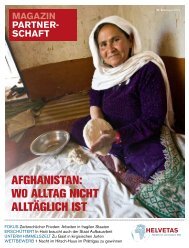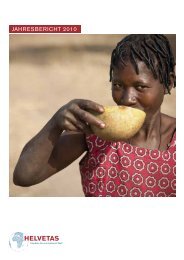Report Feasibility study organic bitter tea Cao Bang - Helvetas
Report Feasibility study organic bitter tea Cao Bang - Helvetas
Report Feasibility study organic bitter tea Cao Bang - Helvetas
You also want an ePaper? Increase the reach of your titles
YUMPU automatically turns print PDFs into web optimized ePapers that Google loves.
<strong>Feasibility</strong> Study Organic Bitter Tea in <strong>Cao</strong> <strong>Bang</strong>: 2007<br />
Table 1. Assessment of improvements to be made to comply with <strong>organic</strong> standards in comparison with the current situation<br />
Applicable Organic Standard Current Situation Improvement to be made<br />
1. Synthetic fertilizers are prohibited. NPK is being used by farmers who planted <strong>bitter</strong><br />
<strong>tea</strong> in their fields as well as in the nursery<br />
2. Chemical plant protection chemicals are<br />
prohibited.<br />
Some farmers use insecticides (Trebon, Bassa) to<br />
control pests in the <strong>bitter</strong> <strong>tea</strong> plantations.<br />
Fungicides are regularly applied to control<br />
diseases in the nursery. One farmer was observed<br />
to have used a herbicide in his <strong>bitter</strong> <strong>tea</strong><br />
plantation.<br />
3. Synthetic hormone is prohibited. A rooting hormone is used in the nursery. It<br />
could not be established whether this hormone is<br />
of a synthetic origin.<br />
4. Farmer must maintain records of sources of<br />
all farm inputs as well as of harvested<br />
products. Records include sales records.<br />
Annual production plans are also required..<br />
5. Parallel production is not allowed: crops in<br />
<strong>organic</strong> fields must be different from crops in<br />
conventional fields.<br />
6. If prohibited substances are used on adjacent<br />
fields, the <strong>organic</strong> field must have a buffer<br />
area to prevent chemical contamination.<br />
At present, farmers do not keep any records.<br />
However, the BTC has a quite detailed system<br />
for keeping records of farmers it is supporting<br />
with establishing new plantations.<br />
Most farmers grow <strong>bitter</strong> <strong>tea</strong> as monoculture,<br />
with a limited number of plots.<br />
Many <strong>bitter</strong> <strong>tea</strong> plantations border fields with<br />
maize, vegetables or rice. Especially in rice and<br />
vegetables chemical fertilisers and pesticides are<br />
being used.<br />
- 13 -<br />
Soil fertility management should include a<br />
variety of materials for example compost, aged<br />
animal manure, green manure and possibly<br />
additional mineral inputs from natural sources.<br />
Compost may be difficult to apply on sloping<br />
land but here green manures will be very<br />
effective, also to control erosion<br />
Organic pest and disease management should be<br />
based on growing a healthy crop and the<br />
application of a variety of preventive measures.<br />
In emergency situation, BT could be used against<br />
caterpillars.<br />
Seedling production without use of synthetic<br />
growth hormone should be studied.<br />
Once farmers start <strong>organic</strong> conversion, they<br />
should start to keep records. BTC's current<br />
system of record keeping could provide good<br />
basis for and ICS.<br />
Farmers should not be allowed to convert only<br />
part of their <strong>bitter</strong> <strong>tea</strong>. If they convert, they<br />
should convert all their plots with <strong>bitter</strong> <strong>tea</strong>.<br />
Farmers should create buffer zones and plant<br />
border crops where required.










